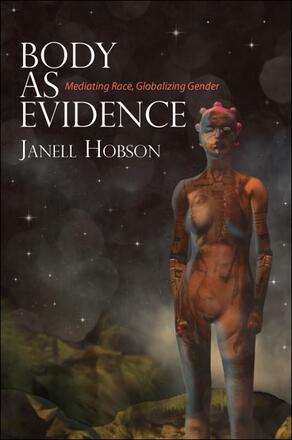
Body as Evidence
Mediating Race, Globalizing Gender
Alternative formats available from:
Analyzes how race and gender intersect in the rhetoric and imagery of popular culture in the early twenty-first century
Description
In Body as Evidence, Janell Hobson challenges postmodernist dismissals of identity politics and the delusional belief that the Millennial era reflects a "postracial" and "postfeminist" world. Hobson points to diverse examples in cultural narratives, which suggest that new media rely on old ideologies in the shaping of the body politic.
Body as Evidence creates a theoretical mash-up of prose and poetry to illuminate the ways that bodies still matter as sites of political, cultural, and digital resistance. It does so by examining various representations, from popular shows like American Idol to public figures like the Obamas to high-profile cases like the Duke lacrosse rape scandal to current trends in digital culture. Hobson's study also discusses the women who have fueled and retooled twenty-first-century media to make sense of antiracist and feminist resistance. Her discussions include the electronica of Janelle Monáe, M. I.A. , and Björk; the feminist film odysseys of Wanuri Kahiu and Neloufer Pazira; and the embodied resistance found simply in raising one's voice in song, creating a blog, wearing a veil, stripping naked, or planting a tree. Spinning knowledge out of this information overload, Hobson offers a global black feminist meditation on how our bodies mobilize, destabilize, and decolonize the meanings of race and gender in an increasingly digitized and globalized world.
Janell Hobson is Associate Professor of Women's Studies at the University at Albany, State University of New York. She is the author of Venus in the Dark: Blackness and Beauty in Popular Culture.
Reviews
"Hobson's book is a tour de force that convincingly and bravely asserts the need for continued attention to the intersection of race and gender; it is a wake-up call for the millennial generation that the fight for justice and equality is far from over. " — Signs
"…Hobson is keenly attuned to the distance between what's been attained and what's yet to be, and the dissonance between what's reported and how life is truly lived. " — Ms. Magazine
"By racializing the analysis of technology, Janell Hobson brings to the forefront some very important issues regarding the digital divide. There is a tendency in some areas of academia to wholeheartedly celebrate new technologies without giving enough thought to how class, gender, race, and geographical divisions affect both the production and consumption ends of the chain. " — Gail Dines, coeditor of Gender, Race, and Class in Media: A Critical Reader, Third Edition